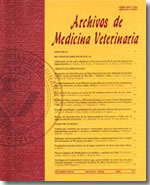Muestreo coprológico de endoparásitos del zorro de Darwin (Pseudalopex fulvipes) en Chiloé, Chile
Contenido principal del artículo
Resumen
Un total de 189 heces del zorro de Darwin (Pseudalopex fulvipes [Martin, 1837]) en peligro crítico de extinción, de diferentes localidades de la isla de Chiloé en el sur de Chile, se examinaron en busca de huevos de parásitos y oocitos usando la técnica de flotación en azúcar. Los resultados mostraron que el 21,2% de las muestras fue positivo a nueve helmintos y/o a un protozoo. Los parásitos con la mayor prevalencia fueron nematodos del orden Ascaridida y un cestodo Spirometra. Otros endoparásitos identificados incluyeron Capillaria sp., Toxocara canis, Toxascaris leonina, Filaroides osleri, nematodos ancylostomatidos, Trichuris sp., Taenia sp., e Isospora sp. Las cargas parasitarias fueron mayores durante el invierno y en áreas con más perros domésticos. Todas estas especies y géneros son reportados por primera vez en el zorro de Darwin.

